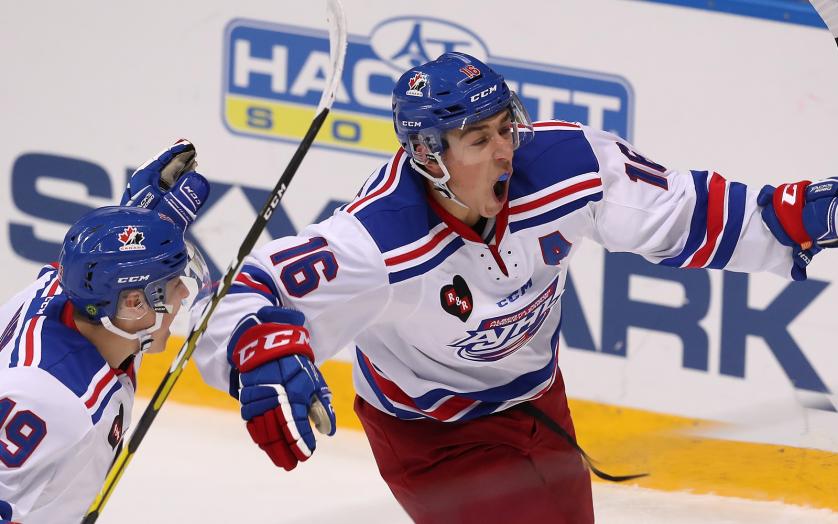
Hello Hockey My Old Friend: Junior Teams Begin Play in Canada
By Scott Lowe - MYHockeyRankings.com
AJHL.ca photo
The date was April 19, 2021, and the Ontario Hockey League was pulling the plug on its season. There would be no games because of COVID-19.
Wait, you mean the 2021-22 season? Not again!
Nope. That was for the 2020-21 season.
After months of waiting, hoping and trying to provide something resembling a season, the OHL would become the only Canadian major-junior league not to be able to even give it a shot. The league said at that time that the recently extended stay-at-home order, combined with an increasing number of COVID cases in Ontario, would make it impossible to have a season.
The hope had been to hold an abbreviated season with pods of teams competing in various hub cities in compliance with provincial and local COVID regulations, a strategy that had been tried in other leagues across Canada. The goal was to provide many of the top under-20 players in the world as possible not only an opportunity to compete and be seen by professional scouts, but also to reward them for their hard work, patience and perseverance.
But it wouldn’t happen.
The decision came at about the same time it was announced that the Memorial Cup, a traditional and popular end-of-the-year event that brings the top major-junior teams from the OHL, the Quebec Major Junior League (QMJHL) and the Western Hockey League (WJL) together to compete in a national-championship tournament along with a team from the host city, would not be played.
The other two leagues that comprise the major-junior Canadian Hockey League (CHL) had given it a go, but the QMJHL faced several in-season COVID-related stoppages, and teams played a maximum of 40 games instead of the usual 64. The WHL finally started its season in January, also facing many obstacles, before finally shutting down at around the same time the Memorial Cup was canceled.
The OHL never got off the ground at all, however.
"We have worked tirelessly with the province and the chief medical officer of health for the past year on different scenarios and different windows of opportunity, but the reality is the conditions in Ontario have never been right to start and complete an uninterrupted, safe opportunity for players to showcase their skills," OHL commissioner David Branch told The Canadian Press upon canceling the season. "We owe it to our players and their families to be definitive. We were committed to return and play this season, but our hopes and desires have been dashed by the cruel realities of COVID-19."
Likewise, Canadian Junior Hockey League (CJHL) teams in Ontario – the CJHL is better known Junior “A” hockey throughout Canada – never really got back on the ice. Other leagues in other parts of the country tried, but mostly experienced a similar fate after starting and stopping multiple times.
In Western Canada, by November the Alberta Junior Hockey League (AJHL), the Manitoba Hockey League (MJHL) and the British Columbia Hockey League (BCHL) had put operations on hold until at least January, with the MJHL and AJHL officially canceling their seasons in February. The Saskatchewan Junior Hockey League attempted to rearrange its league structure based on geography, the difference in severity of restrictions in certain areas and travel restraints, but ultimately the SJHL’s season was halted.
The BCHL also reshuffled its structure, originally attempting a December start to its season before suspending play and finally announcing in March that its 16 teams would play 20 games in five “pod” or bubbled locations. The hope was to complete some semblance of a season and playoffs, but by the time those 20 games were played, it was apparent that ongoing provincial restrictions were going to make postseason play impossible.
Moving to Eastern Canada, the Maritime Hockey League (MHL) announced a 52-game schedule last summer then reduced that to 40 games in October. The league grouped teams geographically to deal with local and provincial regulations and restrictions and faced numerous obstacles and shutdowns throughout the season.
Individual teams began shutting down operations in April, and when the dust settled, teams in the North Division played between 19 and 27 games, while teams in the south played between 23 and 36 contests. The eight teams choosing to end their seasons meant there would be no South Division champion. It was determined that the North Division playoffs would continue into May and that a North Division champion would be crowned but that there would be no league champion for the 2020-21 season.
The Quebec Junior Hockey League (QJHL or LHJAAAQ) tried to wait out the pandemic, but ultimately canceled its season
There are many other junior leagues at various levels throughout hockey-crazed Canada, and none of them had anywhere near what could be characterized as a "normal" season.
Hopefully, the disappointment and frustration from last season becomes a distant memory tonight when the puck drops on the AJHL and MJHL seasons. Meanwhile, the SJHL is slated to start up Sept. 24, with the BCHL dropping the puck Oct. 8.
In Ontario, the Superior International Junior Hockey League (SIJHL) also opens play tonight, while the Northern Ontario Junior Hockey League (NOJHL) got underway Thursday. The Central Canada Junior Hockey League begins play Sept. 23, and the Ontario Junior Hockey League (OJHL) opens on Oct. 1.
Heading east, the QJHL began play with six games Sept. 10, and the MHL gets underway Sept. 30.
“We are all excited about this news,” said QJHL commissioner Kevin Figsby when announcing the league’s schedule earlier this summer. “We’re going to be playing hockey with normal lineups; it’s a sign that we’re moving in the right direction. We’re extremely happy with our teams and our supporters.”
At the major-junior level, each of the three CHL circuits will be starting in the weeks ahead, with the QMJHL and WHL beginning play Oct. 1 and the OHL starting Oct. 7.
“The thing I’m looking the most forward to is getting back to the ice after such a long layoff…” said Harry Mahesh, general manager and head coach of the Winnipeg Freeze in an interview posted on the MJHL website. “I think these players are really eager to get things going. You’re going to see a very determined mindset in the guys when the season gets started. Players know they lost a lot of development time and will be doing all they can to make it up.”
Players will be back on the ice and fans will be allowed back into the arenas. Professional and college scouts will be back on the road searching for the next generation of prospects for their teams. On the surface it will look and feel like a “normal” hockey season.
Of course, there will be vaccine mandates for players and staff members – as well as vaccine and mask mandates for spectators – in many areas of Canada. Some jurisdictions may not allow arenas to be filled to 100 percent capacity right away, and an air of caution will continue to hover over the sport as local governments, league officials and team staff members respond to COVID’s continued presence.
“It’s the signal for a day we’ve all been waiting for,” Zoran Rajcic, chief operating officer of Consolidated Sports Holdings, which owns the WHL’s Everett Silvertips, said in announcing his team’s Oct. 8 season opener. “We applaud the passion, energy, and patience of our fans, and look forward to hearing them roar with us once again … Angel of the Winds Arena on game night is an environment built by our fans as one of the most intimidating and energetic in all of hockey, and we want to see everyone back safely. As we are still vigorously following state and local health guidelines to meet the goal of 100 percent capacity, we encourage our fans to do so as well, and will be announcing further details soon.”
Nothing beats the excitement of a season’s opening night, and after the trials, tribulations and disappointment experienced by players, staff members, families and fans a year ago, the opening to the 2021-22 junior hockey season in Canada will be extra special.
It will feel like a nation’s long-lost best friend has returned home after a year away. It also means that within a few short weeks ice rinks all over Canada will be buzzing with players of all ages doing what they love most. It won’t be a full return to normal, but after the trying times of the past 18 months, a return to “near normalcy” will be welcomed with open arms.
“I think it’s great for the staff, the fans, the players to look forward to something …” said Mat Hehr, head coach and general manager of the SJHL’s Yorkton Terriers, when news of the league’s plans for the 2021-22 season were announced last spring. “If we can get some fans back in the building, it’s exciting for not only the coaches, but the players as well. I know they get pretty excited when they’re able to play in front of their friends and family, so hopefully we can have a great season.”
Junior hockey also is an important part of local economies throughout Canada, something that often is overlooked. Last season’s shutdowns had a major impact on the financial bottom lines of many teams as a result of lost ticket and sponsorship revenue. In addition, gameday employees and other staff members found themselves out of work, and local businesses lost out on revenue generated by the fans teams attending games and other ancillary revenue streams related to the operation of junior teams in their communities.
“It’s an exciting time for everyone as we turn our attention to a new season,” OHL Commissioner David Branch said when announcing his league’s plans to return to action. “We look forward to getting our players back into their OHL communities where they can continue to pursue their goals both on the ice and in the classroom.”
Junior hockey is a staple of everyday life in Canada and is different from virtually any other opportunities available to teenage athletes in North America. Although leagues and teams did their absolute best to make an impossible situation tolerable last year, it just wasn’t the same, and there is much to be thankful for as junior leagues across the nation prepare to start their 2021-22 campaigns on time.
“I am excited about getting back on the ice with our staff and working with our players,” Paul Dyck, head coach and GM of the Steinbach Pistons in the MJHL, said in his team’s preview on MJHLhockey.ca, “{and} getting back on a bus with our team again, connecting with our fans and corporate supporters at our games, watching our players get involved in our community and developing new friendships – and hopefully playing in front of a full building again at some point this season.”

